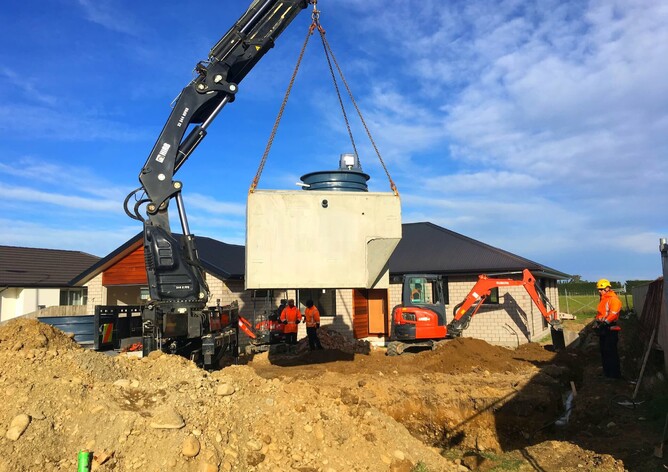A critical component of any off-grid or remote property is a dependable wastewater treatment system. Aerobic treatment systems are a more recent innovation in domestic wastewater treatment. Unlike septic systems, which rely on anaerobic bacteria, aerobic systems use oxygen to break down wastewater. This process is considerably faster and more efficient than anaerobic decomposition.
A critical component of any off-grid or remote property is a dependable wastewater treatment system. These systems are designed to treat wastewater from your home, ensuring it complies with environmental regulations and is safe for disposal or reuse.
There are two main types of domestic wastewater treatment systems: septic systems and aerobic treatment systems.
SEPTIC SYSTEMS
Septic systems are the most common type of domestic wastewater treatment system. They function by employing a natural, anaerobic process to decompose wastewater. A septic tank, a buried chamber, is the primary component of a septic system. Wastewater flows from your home into the septic tank, where solids settle and decompose anaerobically (without oxygen).
The effluent, the liquid portion of the wastewater, then exits the tank and flows into a drain field. The drain field is a network of perforated pipes buried in gravel-filled trenches. The effluent seeps through the gravel, where it's further treated by bacteria in the soil before eventually filtering back into the ground.
AEROBIC TREATMENT SYSTEMS
Aerobic treatment systems are a more recent innovation in domestic wastewater treatment. Unlike septic systems, which rely on anaerobic bacteria, aerobic systems use oxygen to break down wastewater.
This process is considerably faster and more efficient than anaerobic decomposition. Aerobic systems also produce a higher quality effluent that can be reused for irrigation or discharged into waterways with fewer restrictions.
One such aerobic treatment system is the Ozzi Kleen RP10. The Ozzi Kleen RP10 is a fully aerobic sewage treatment system that treats household wastewater. It's an alternative to traditional septic systems that use an anaerobic process. The Ozzi Kleen RP10 system is lightweight, making it easy to install. It can be buried in your garden, with only the control box visible above ground.
The RP10 system utilizes oxygen to break down waste. This method is significantly faster and more efficient than anaerobic decomposition in septic tanks. The treated effluent can be safely reused for irrigation purposes, reducing reliance on municipal water supplies and lowering your water bills.
BENEFITS OF RESIDENTIAL WASTEWATER TREATMENT SYSTEMS
There are several advantages to installing a residential wastewater treatment system on your property:
Environmental Friendliness: Aerobic treatment systems, like the Ozzi Kleen RP10, are more environmentally friendly than traditional septic systems. They break down wastewater more efficiently, minimizing the risk of groundwater contamination. Additionally, treated effluent can be reused for irrigation, reducing reliance on freshwater resources.
Lower Maintenance Needs: Aerobic systems generally require less maintenance than septic systems. They don't need to be pumped out as frequently, as the aerobic process effectively breaks down solids.
Efficiency and Performance: Aerobic systems treat wastewater more efficiently than septic systems. They produce a higher quality effluent that can be reused for irrigation or discharged with fewer environmental concerns.
Suitability for Diverse Locations: Aerobic treatment systems are a viable option for various locations, including properties with limited space or poor soil conditions unsuitable for traditional septic drain fields.
FACTORS TO CONSIDER WHEN CHOOSING A RESIDENTIAL WASTEWATER TREATMENT SYSTEM
When selecting a residential wastewater treatment system for your property, several factors need to be considered:
System Capacity: The system's capacity must be sufficient to handle the wastewater volume generated by your household.
Site Conditions: The soil composition, drainage characteristics, and available space on your property will influence the type of system suitable for installation.
Local Regulations: The regulations in your area regarding wastewater treatment and effluent disposal will determine the type of system you can install. Consulting with your local council or a qualified wastewater treatment professional is recommended to ensure your chosen system complies with all relevant regulations.
Maintenance Requirements: Consider the ongoing maintenance requirements of the system. Aerobic systems generally require less maintenance than septic systems, but they still need regular servicing to ensure optimal performance.
CONCLUSION
Domestic wastewater treatment systems are essential for ensuring the safe and environmentally sound disposal of wastewater from your home. By understanding the different types of systems available, such as septic systems and aerobic treatment systems exemplified by the Ozzi Kleen RP10, you can make an informed decision on the most suitable system for your property's specific requirements and local regulations.
Residential wastewater treatment systems offer numerous advantages, including environmental responsibility, lower maintenance needs, efficient performance, and suitability for various locations.
By carefully considering factors like system capacity, site conditions, local regulations, and maintenance requirements, you can ensure you select a system that effectively treats your household wastewater while complying with environmental standards.


